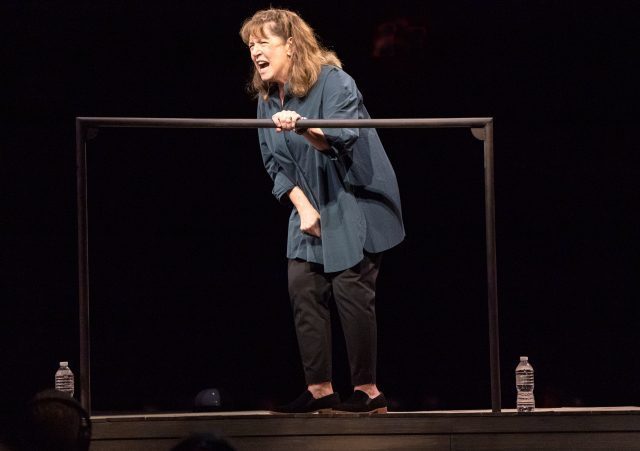
Ann Dowd is mesmerizing in one-woman Enemy of the People at Park Ave. Armory (photo by Stephanie Berger)
ENEMY OF THE PEOPLE
Park Ave. Armory
643 Park Ave. at Sixty-Seventh St.
June 22 – July 9 (canceled)
www.armoryonpark.org
Water, water everywhere: It was an odd coincidence that on City of Water Day, July 10, when the Waterfront Alliance hosts special events to raise awareness about water and the environment, Park Avenue Armory announced the cancellation of its widely praised extended run of Robert Icke’s superb reimagining of Henrik Ibsen’s Enemy of the People — which deals with poisoned water. The ninety-minute one-woman show, scheduled to continue through August 8, was forced to halt because star Ann Dowd had to “address a pressing family matter.” In another odd coincidence, on City of Water Day, I was watching NYClassical’s adaptation of King Lear with Nahum Tate’s 1681 “happy ending” when a sudden, unexpected storm hit the shores of Manhattan and forced us to scurry home, missing the positive conclusion. (Dark clouds became visible on the horizon just as the storm scene began.)
Ibsen’s play about the conflict between public good and private conscience famously centers on water. Icke’s adaptation updates it to the modern-day fictional community of Weston Springs, which advertises, “Come for Mother Nature’s therapy; stay afterwards for some retail therapy. Weston Springs, renowned the world over as a wonder in a mountain paradise. Quench your thirst.” The action opens as Dr. Joan Stockman has discovered that there’s a dangerous amount of lead in the water, which people both bathe in and drink. She wants her brother, Peter, the mayor, to close the spa immediately and authorize an expensive, multiyear reconstruction, which Peter argues would devastate the town’s economic stability. Dr. Stockman takes her case to the people and the local newspaper, resulting in tense discussions and arguments about the role of government, free speech, and the value of human life itself.
Enemy of the People is beautifully staged by Icke on Hildegard Bechtler’s awe-inspiring set, consisting of long wooden walkways that Dowd traverses, stopping at certain points and delivering her monologues; the audience listens through headphones, although when the actress was closer to me, I took them off to hear her natural timbre. (The sound design is by Mikaal Sulaiman.) Dowd serves as omniscient narrator and voices such characters as Joan and Peter; Joan’s husband, Jeffrey Cooper; immigrant housekeeper Vidya; Artie Goldman, editor of the Weston Eagle; his deputy editor, Robin; Dr. Mona at the Weston Medical Centre; Lily, the mayor’s press secretary; and various other members of the community. In the middle of the set is a circular spinning table on which Dowd places miniature white buildings, calling to mind both a globe and the Wheel of Fortune. Cameras also follow Dowd, who can be seen on two large screens at opposite ends of the space; when she is portraying a conversation between two characters, two shots of her are visible, the camera cutting back and forth between them. (The projections and video are by Tal Yarden, with lighting by Natasha Chivers.)

Ann Dowd plays multiple characters in interactive Enemy of the People at Park Ave. Armory (photo by Stephanie Berger)
Enemy of the People could only happen at the armory, in its massive Wade Thompson Drill Hall, which has recently been home to Steven Hoggett, Christine Jones, and David Byrne’s SOCIAL! the social distance dance club, Laurie Anderson and Jason Moran’s Party in the Bardo, and Bill T. Jones’s Afterwardsness as the pandemic lockdown lifts. The limited audience, all of whom must be vaccinated, is seated in pods of two to five at socially distanced rectangular tables that are equipped with a small desktop monitor that plays a commercial, mimics the internet, and presents questions for each group to answer by pressing one of two buttons; the results affect which direction the narrative follows, so each show is different. (It also accounts for why there are Teleprompters on the floor scrolling the dialogue for Dowd to scan, since there are several possible variations that would be nearly impossible to memorize.)
The tables are situated on a giant map of Weston Springs, as if each pod is a house on a particular street. The audience is given sixty seconds to discuss each question among themselves and arrive at one answer; the queries range from the relatively innocuous choice between coffee or tea to the more serious decision whether to go public with Joan’s findings or proceed carefully to minimize panic.
Emmy winner Dowd (The Handmaid’s Tale, Night Is a Room) is hypnotic, evoking a kind of easygoing Our Town demeanor with occasional blasts of emotion as characters get angry. I got mad at myself whenever I started watching her onscreen, preferring to experience her in reality. Icke, who has previously put his imprimatur on Ibsen’s The Wild Duck and A Doll’s House, Chekhov’s Uncle Vanya and Ivanov, Aeschylus’s Oresteia, Shakespeare’s Hamlet, and Orwell’s 1984 on Broadway, has done a sublime job of translating a nineteenth-century story into the present, evoking not only the water crisis in Flint but how Americans talk to one another today, with partisan politics leading to fights over nearly every aspect of contemporary life and the very act of voting itself. It’s a sad tale, one that doesn’t appear to have any easy answers. It’s also sad that the show had to be canceled; whatever Dowd’s personal situation is, we wish her the best.